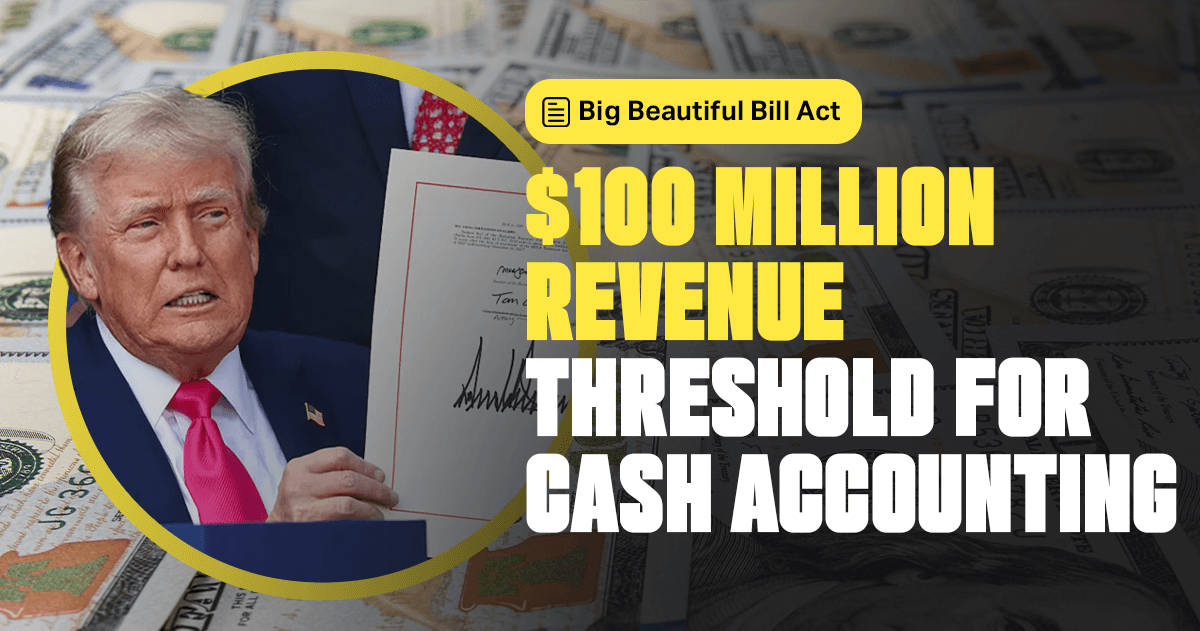You know what’s beautiful? When the government accidentally does something that makes sense for small business owners.
I was talking to this guy who runs a manufacturing company—makes custom parts for the automotive industry. Good business, growing fast, but he was drowning in paperwork because once you hit certain revenue thresholds, Uncle Sam forces you to use something called “accrual accounting.”
Picture this: It’s like being forced to count every penny you’re supposed to get and every bill you’re going to pay, even if the money hasn’t actually moved yet. It’s accounting for people who apparently have nothing better to do than track imaginary transactions.
My buddy’s pulling his hair out. “Andrew, I’ve got $30 million in revenue, but half my time is spent on accounting bullshit instead of actually running the business. Meanwhile, my competitor down the street with $24 million gets to use simple cash accounting—money in, money out, done.”
“That sucks,” I said.
“It gets worse. I had to hire two more bookkeepers just to handle the compliance. That’s $120,000 a year in salaries for people who don’t make me a single dollar.”
I didn’t grow up on the right side of money, so when the government creates rules that punish success with extra paperwork, that feels personal. But here’s the thing—Trump’s Big Beautiful Bill just moved the goalpost, and it’s about damn time.
They raised the threshold for mandatory accrual accounting from $25 million to $100 million for manufacturing businesses. That means if you’re making stuff in America and your revenue is under $100 million, you can stick with cash accounting—the simple, straightforward method that doesn’t require a PhD in advanced mathematics to understand.
But let’s be honest—most business owners don’t even know what the hell accrual accounting is, much less why they should care about this change.
So let me break it down like you’re my neighbor, not some MBA who speaks in acronyms:
Cash accounting is simple. Money comes in, you record it. Money goes out, you record it. It’s like balancing your checkbook, except for your business. You can see exactly where you stand at any given moment.
Accrual accounting is like living in an alternate universe where you have to pretend money exists before it actually does. You record income when you send an invoice, even if the customer hasn’t paid yet. You record expenses when you receive a bill, even if you haven’t written the check. It’s accounting for people who enjoy making simple things complicated.
The old rule said if you hit $25 million in average annual revenue over three years, boom—you’re forced into accrual accounting hell. The new rule says manufacturing businesses can stay with cash accounting until they hit $100 million.
How many of you are running manufacturing businesses between $25 million and $100 million? How many of you have been dealing with accrual accounting bullshit because you crossed that arbitrary threshold?
You see what I mean? This isn’t just about paperwork—this is about giving successful manufacturers the freedom to focus on manufacturing instead of drowning in administrative overhead.
Think of it like this: The old system was like forcing everyone who made more than $25 million to file taxes using a 500-page form written in ancient Latin. The new system says, “You know what? Keep using the simple form until you hit $100 million.”
The math ain’t mathin’ if you’re spending more time on accounting compliance than on growing your business.
But here’s what separates the smart money from everyone else—they understand this change isn’t just about convenience. It’s about competitive advantage. While your competitors are hiring extra accountants and drowning in accrual accounting complexity, you can reinvest that time and money into product development, marketing, and actually serving customers.
My manufacturing buddy? He just fired one of his bookkeepers and hired a sales guy instead. Same money, but now he’s focused on growth instead of compliance. Last month, he landed his biggest contract ever while his competitor was busy reconciling accounts receivable.
This isn’t just about money, though. This is about recognizing that manufacturing is the backbone of American prosperity.
When you make it easier for manufacturers to focus on manufacturing, everybody wins. More jobs, better products, stronger communities.
I’m not doing this for applause, but I’ve seen too many good businesses get strangled by red tape. They’re building great products and employing good people, but they’re spending half their energy navigating bureaucratic bullshit instead of innovating and growing.
Money is a game, but sometimes the rules actually get better instead of worse.
You create products, you manage cash flow simply, you focus on what matters, and you multiply what counts most—American manufacturing jobs, community wealth, and your own ability to compete without bureaucratic handcuffs.
So here’s my challenge: Stop thinking like someone who accepts whatever compliance burden the government hands you. Start thinking like someone who understands that when the rules get simpler, it’s because someone finally realized that successful businesses create more value when they’re not drowning in paperwork.
The shoebox mentality says “follow whatever rules they give you and hope for the best.” The $100 million threshold mentality says “use every advantage the law provides to focus on what really matters.”
Which manufacturer are you going to be?






